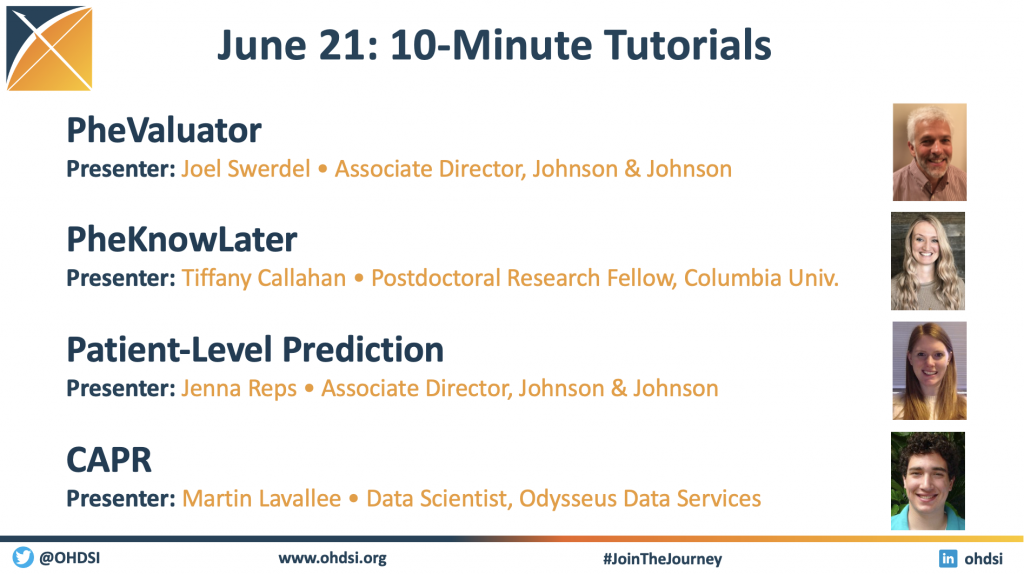- Who We Are
- Updates & News
- Standards
- Software Tools
- Network Studies
- Community Forums
- Education
- New To OHDSI?
- Community Calls
- Past Events
- Workgroups
- 2024 ‘Our Journey’ Annual Report
- Current OHDSI Events
- Support & Sponsorship
- CBER Best Seminars
- 2024 Global Symposium
- Guideline Opportunities
- Github
- YouTube
- Newsletters
10-Minute Tutorials:
PheValuator, PheKnowLator, Patient-Level Prediction (PLP) & Cohort definition Application Programming in R (CAPR)
OHDSI offers a wide range of open-source tools to support various data-analytics use cases on observational patient-level data. Many of these tools are developed and maintained by community members, including those in our HADES and Open-Source Community workgroups (use this link to join our workgroups). Four of our open-source tools were the focus of a June “10-Minute Tutorial” community call, where the tool leads provided a brief presentation on the tool and how it can be used. Each of those presentations, along with slides and further information, are available below.

PheValuator
Presenter: Joel Swerdel
Per its GitHib page: The goal of PheValuator is to produce a large cohort of subjects each with a predicted probability for a specified health outcome of interest (HOI). This is achieved by developing a diagnostic predictive model for the HOI using the PatientLevelPrediction (PLP) R package and applying the model to a large, randomly selected population. These subjects can be used to test one or more phenotype algorithms.
Presentation Slides
PheKnowLator
Presenter: Tiffany Callahan
Per its GitHib page: PheKnowLator (Phenotype Knowledge Translator) or pkt_kg is the first fully customizable knowledge graph (KG) construction framework enabling users to build complex KGs that are Semantic Web compliant and amenable to automatic Web Ontology Language (OWL) reasoning, generate contemporary property graphs, and are importable by today’s popular graph toolkits.
Presentation Slides
PLP
Presenter: Jenna Reps
Per its GitHib page: PatientLevelPrediction is an R package for building and validating patient-level predictive models using data in the OMOP Common Data Model format.
CAPR
Presenter: Martin Lavallee
Per its GitHib page: Capr is an R package to develop and manipulate OHDSI cohort definitions. This package assists in creating a cohort definition that can be compiled by circe-be using CirceR. Cohort definitions developed in Capr are compatible with OHDSI ATLAS. Additionally the package allows for development of cohort design components, sub-items of a cohort design that are meant to be reusable and mutable to assist creating cohorts in study development.
